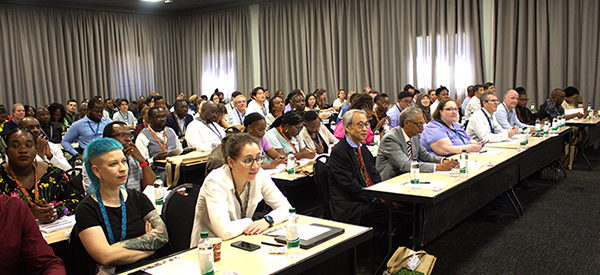Unisa Makes History Hosting Two IWA Conferences, a Landmark Achievement for Africa
The NOM8 Conference, which took place from 3 to 6 December 2023, provided a platform for researchers from across the globe to share the latest scientific and practical knowledge on natural organic matter in diverse water environments, drinking water, wastewater and recycled water.
On the other hand, the Particle Separation Conference, which followed from 6 to 8 December 2023, covered advances in particle science and characterisation, as well as basic mechanisms of particle separation processes, the occurrence of, and changes in, natural and synthetic nano- and micro-particles in surface waters and wastewaters, and their impact on treatment processes.
Progress made in particle removal technologies, such as coagulation, flocculation, sedimentation, flotation, filtration and membrane processes were also be discussed in depth. Both conferences were held to coincide with the 150th anniversary of the University of South Africa and boasted the attendance of close to 200 registered delegates from all continents and from 30 different countries.
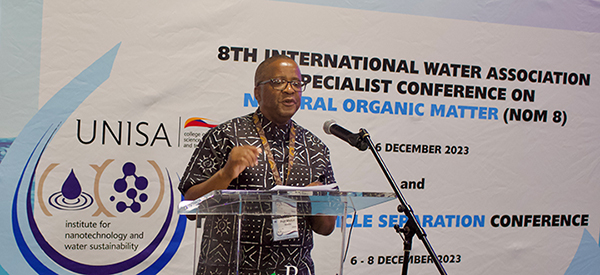
Prof Bhekie Mamba, Executive Dean, CSET, and chair of the local organising committee
“Reflecting back, despite having pledged ourselves as the University of South Africa to host both conferences in the year 2021, right after the Particle Separation Conference and the 7th Natural Organic Matter specialist conferences had taken place in Japan in 2019, I extend our sincere appreciation to both conference committees on agreeing that we would host both conferences in South Africa, for the very first time, back-to-back,” said Prof Bhekie Mamba, Executive Dean, CSET, and chair of the local organising committee, in his welcome address.
He continued: “The committees did not succumb to earlier pressures to have these conferences hosted online or in a hybrid setting, but were prepared to wait until the COVID-19 reality was behind us. That optimism and willingness for them to wait for four years for the conferences to be held in South Africa, is a vote of confidence in us and we don’t take it for granted.”
International Water Association explained
In giving an address on behalf on the IWA, the incoming president-elect, Prof Hamanth Kasan, expressed words of congratulations to Unisa on managing to get the chairs of both IWA specialist conferences (Prof Satoshi Takaziwa and Prof Katsuki Kimura) in one seating; something that has never been done before.
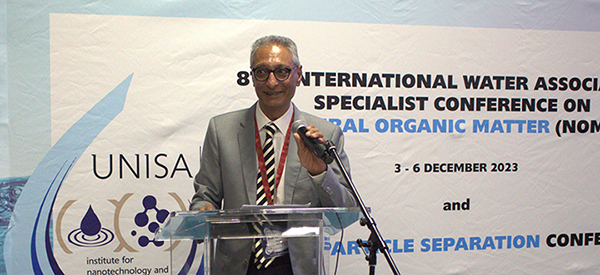
Prof Hamanth Kasan, incoming president-elect of the IWA
“It is very unique for me to be standing in front of two chairs of two specialist groups in the IWA at these back-to back conferences. In my entire career within the IWA, this has never happened before,” he said. The purpose of the IWA is to inspire change globally in water and sanitation. “This is done through pioneering science, innovating technology and developing leading best practices and connecting people to share solutions, which is what we are doing through these two conferences,” explained Kasan. The IWA was formed over 25 years ago through the successful merger of the Wastewater Association and the Drinking Water Association. “I want to pay tribute to two eminent South African pioneers, Piet Odendaal who was the executive director of the Water Research Commission, and Vincent Bath who was the chief executive officer of Rand Water; these two had the passion and the foresight and were the driving force towards the merging of the two associations into one, which today is known as the International Water Association,” said Kasan.
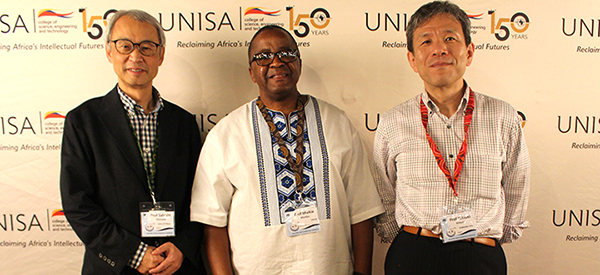
Prof Bhekie Mamba flanked by the chairs of both IWA specialist conferences, Prof Satoshi Takaziwa (left), and Professor Katsuki Kimura
In closing, he said: “We trust that both conferences will result in improved practices, widescale adoption and application of improvements in order to provide good quality water to all those that have been waiting so long. This is in synchrony with the IWA’s intent of inspiring change for impact.”
Unisa’s take on the water agenda
In her address at the conferences, Prof Thenjiwe Meyiwa, Unisa’s Vice-Principal of Research, Postgraduate Studies, Innovation and Commercialisation, highlighted Unisa’s take of the African water challenges against the resolve of the African Union in order to transform the continent into a prosperous space where there is development and stability. An extract from her address, The 2014 Agenda 2063 Grand Imperative – The Africa We Want, outlines seven key aspirations that the continent should have accomplished by the time it celebrates the centennial of the establishment of the Organisation of African Unity (OAU) in 2063. These include:
- A prosperous Africa based on inclusive growth and sustainable development
- An integrated continent, politically united and based on the ideals of Pan Africanism and the vision of Africa’s Renaissance
- An Africa of good governance, democracy, respect for human rights, justice and the rule of law
- A peaceful and secure Africa
- An Africa with a strong cultural identity, common heritage, values and ethics
- An Africa where development is people-driven, unleashing the potential of its women and youth
- Africa as a strong, united, and influential global player and partner
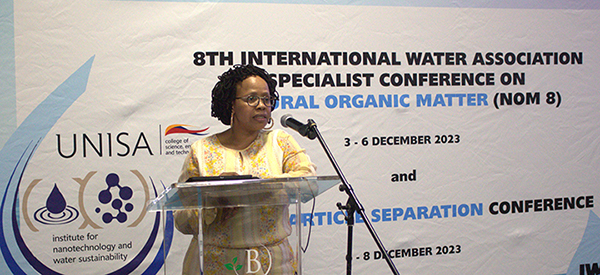
Prof Thenjiwe Meyiwa, Unisa’s Vice-Principal of Research, Postgraduate Studies, Innovation and Commercialisation
“These aspirations within which management of water is integral should inform the development trajectory of every organisation on the continent, both public and private,” she said. “As a university, our stated vision is to be the African university shaping futures in the service of humanity. Thus, the University of South Africa, partnering researchers and professionals from other universities, municipalities and industry wishes to play a central role in contributing to the agenda of these back-to-back conferences because 2063 is too far.”
Wednesday, 6 December 2023, was dedicated to combined sessions of the NOM8 and Particle Separation conferences and inclusive of an adjudicated poster session. During the conference dinner, best poster presentation awards were announced. The adjudication considered top scoring presentations, gender balance, the balance between institutions and the promotion of doctoral students. The best poster award went to Nomcebo P Khumalo (iNanoWS, Unisa), the second prize to Ronewa Netshithothole (iNanoWS, Unisa) and the third to Zhaozhou Peng (University of Johannesburg).
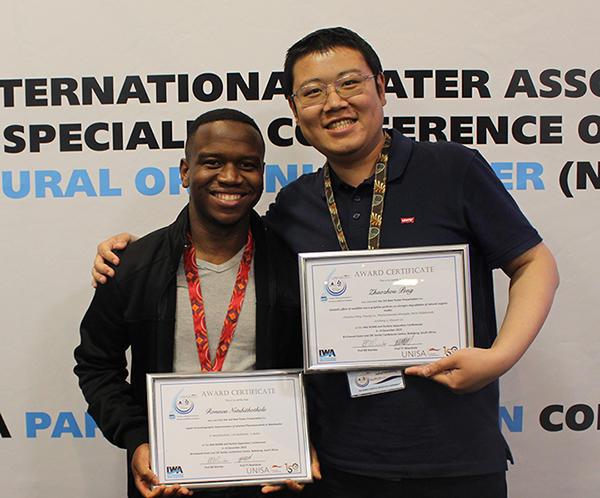
Student poster runners-up (from left) Ronewa Netshithothole (iNanoWS, Unisa, 2nd prize), and Zhaozhou Peng (University of Johannesburg, 3rd prize)
At the closing ceremony on 8 December 2023, the host of the 9th Natural Organic Matter Specialist Conference (NOM9) was announced to be Stanford University in the United States. It will be chaired by Prof William Mitch who was one of the plenary speakers at the NOM8 conference. The candidate city for the next Particle Separation Conference was announced as Sapporo, in Japan. Exact dates and themes for both conferences will be confirmed in due course.
The conferences had diverse representation, with delegates hailing from various countries, institutions of higher learning and companies. Attendance by a total of 197 registered delegates underscored the global collaboration that took place at these conferences, which were the latest highlight in the institution’s 2023 celebration of 150 years of excellence, themed, appropriately, Reclaiming Africa’s Intellectual Futures.

